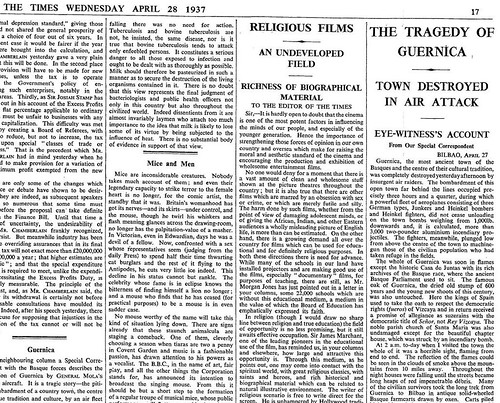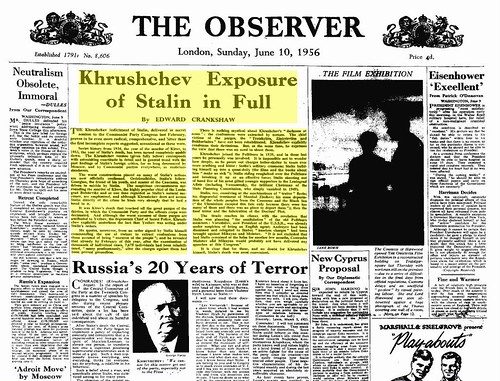Press Gazette scoop search
Part 1: 1922-1995
Inspired by the Daily Telegraph’s historic scoop on MPs’ expenses Press Gazette launched a search for the top 50 British journalism scoops of the modern era.
The results of our survey of Press Gazette readers appears in the July edition of Press Gazette magazine, which is with subscribers now.
Part one takes us from the discovery of Tutenkhamen’s burial chamber in The Times in 1922 to World in Action and The Guardian’s demolition of Jonathan Aitken in 1995 with their revelations about his dealings with Saudi arms dealers.
To read the full list you need to subscribe to Press Gazette.
But by way of a taster, here are my five favourites from part one:
1937 – The Times – The Tragedy of Guernica

A report of the destruction of the Spanish town by an air-raid which was the precursor of tactics used throughout the Second World War.
The Times Special Correspondent wrote:
“In the form of its execution and the sale of the destruction wrought, no less than in the selection of its objective, the raid on Guernica is unparalleled in military history.”
It drew the eyes of the world to the use of German planes in the massacre of civilians and inspired Picasso’s famous painting.
1956 – Reuters (John Rettie) – Kruschev denounces Stalin

Reuters correspondent John Rettie revealed that Soviet leader Nikita Khruschev had denounced his predecessor Joseph Stalin at a secret session of the 20th Congress of the Soviet Communist Party.
A scoop with historic consequences, the shockwaves of which would help lead to the Hungary uprising later that year.
Rumours were rife that Khruschev had spoken out against Stalin – but Rettie was the only journalist to obtain an eye-witness account. It was single-sourced, but Rettie and his editors decided to run with it. The story appeared without a byline, under a Moscow dateline, after Rettie had left the country.
1974 – The Daily Express (Colin Mackenzie) – Biggs Arrested

Perhaps the greatest Fleet Street caper of all – which resulted in Great Train Robber Ronnie Biggs being tracked down in Rio only for Scotland Yard’s Jack Slipper to fail to arrest him. It later led to Tony Delano’s book: Slip-Up and the 1988 film scripted by Keith Waterhouse, The Great Paper-Chase.
1978 – Daily Mirror (Barry Wigmore, Roger Beam, Frank Palmer, Tony Delano and photographer Kent Gavin)- The Real McKinney

In 1978 the Daily Mirror led the Fleet Street pack with a series of scoops centred around the story of Joyce McKinney who came to Britain in pursuit of the love of her life, a Mormon missionary, and ended up kidnapping him and chaining him to a bed.
Reporter Barry Wigmore told Press Gazette: “After a couple of initial cock-ups, Mirror news editor Alan Shillum assigned me to work the story with Roger Beam.
“We started breaking stories about this over the top character. Things got even better when she jumped bail and fled to the US, and we revealed that she did it dressed as a nun.
“Then we tracked down some bent minicab drivers she’d hired for the kidnapping. Paydirt! One of them told me he knew where there were nude pix of Joyce. They were with a guy in LA. With dreams of a trip to Calif, Beam and I told Shillum. But we didn’t know that Kent Gavin and Frank Palmer were already out there on a secret squirrel story. I had to pass on the info to them.”
1986 – Sunday Times (Peter Hounam) – Revealed: The secrets of Israel’s nuclear arsenal

Peter Hounam met Moroccan-born Israeli Mordechai Vanunu in Australia to hear his claims that he knew devastating details of Israel’s extensive and top-secret nuclear weapons programme.
After a 12-day debrief Vanunu was flown back to London. The Sunday Times was particularly anxious not to have a repeat of the Hitler Diaries hoax of three years earlier so spent some weeks verifying Vanunu’s information with nuclear scientists.
Vanunu was moved around by the Sunday Times to different hotels – and it was after moving him to a hotel in central London that he fell under the influence of an attractive Mossad agent who lured him to Rome where he was snatched by the Israelis. Vanunu was eventually released by Israel in 2004 and Hounam was among the first to embrace him.
- There is still time to get your nominations in for the second half of Press Gazette’s search for the best British journalism scoops – from 1995 to the present day. To get your nomination in, email dominicp@pressgazette.co.uk.
Email pged@pressgazette.co.uk to point out mistakes, provide story tips or send in a letter for publication on our "Letters Page" blog
